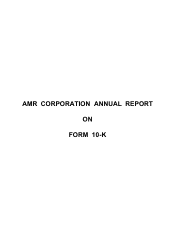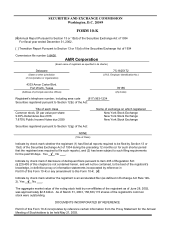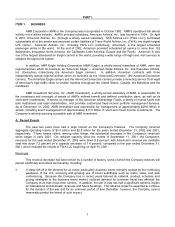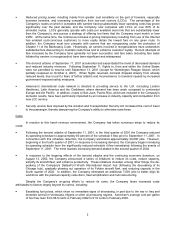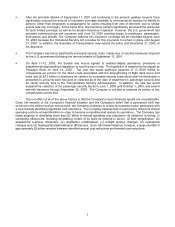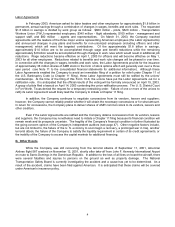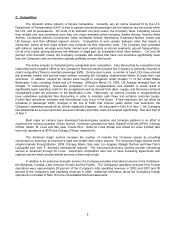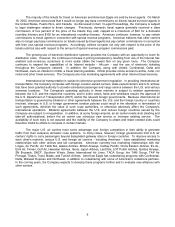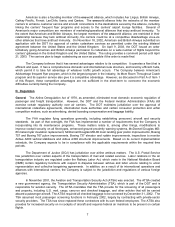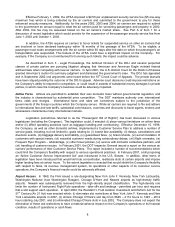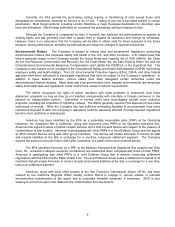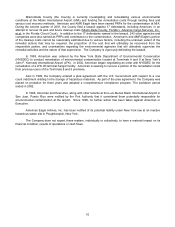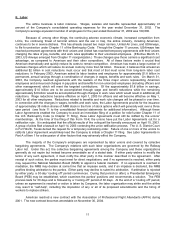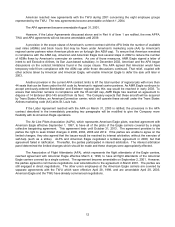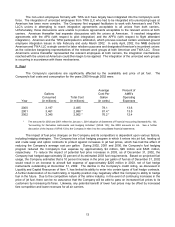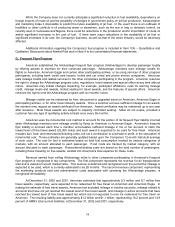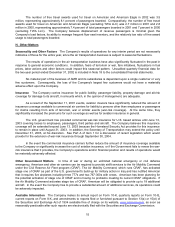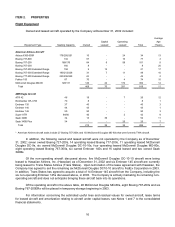American Airlines 2002 Annual Report Download - page 8
Download and view the complete annual report
Please find page 8 of the 2002 American Airlines annual report below. You can navigate through the pages in the report by either clicking on the pages listed below, or by using the keyword search tool below to find specific information within the annual report.6
The majority of the tickets for travel on American and American Eagle are sold by travel agents. On March
18, 2002, American announced that it would no longer pay base commissions on tickets issued by travel agents in
the United States, Puerto Rico, and Canada. As discussed in Item 3 Legal Proceedings, the Company is subject
to legal challenges related to these changes. Previously, domestic travel agents generally received a base
commission of five percent of the price of the tickets they sold, capped at a maximum of $20 for a domestic
roundtrip itinerary and $100 for an international roundtrip itinerary. American continues, however, to pay certain
commissions to travel agents in connection with special revenue programs. American believes that other carriers
also no longer pay base commissions on tickets issued by travel agents but pay certain commissions in connection
with their own special revenue programs. Accordingly, airlines compete not only with respect to the price of the
tickets sold but also with respect to the amount of special revenue program commissions paid.
The growing use of electronic distribution systems provides the Company with an opportunity to lower its
distribution costs. However, the continuous increase in pricing transparency resulting from use of the Internet has
enabled cost-conscious customers to more easily obtain the lowest fare on any given route. The Company
continues to expand the capabilities of its Internet website - AA.com - and the use of electronic ticketing
throughout the Company's network. In addition, the Company, along with United, Continental, Delta and
Northwest, owns an interest in Orbitz, a travel planning website. Orbitz provides online access to airline, hotel, car
rental and other travel services. The Company also has marketing agreements with other internet travel services.
International air transportation is subject to extensive government regulation. In providing international air
transportation, the Company competes with foreign investor-owned carriers, state-owned carriers and U.S. airlines
that have been granted authority to provide scheduled passenger and cargo service between the U.S. and various
overseas locations. The Company's operating authority in these markets is subject to aviation agreements
between the U.S. and the respective countries, and in some cases, fares and schedules require the approval of
the U.S. Department of Transportation (DOT) and/or the relevant foreign governments. Because international air
transportation is governed by bilateral or other agreements between the U.S. and the foreign country or countries
involved, changes in U.S. or foreign government aviation policies could result in the alteration or termination of
such agreements, diminish the value of such route authorities, or otherwise adversely affect the Company's
international operations. Bilateral agreements between the U.S. and various foreign countries served by the
Company are subject to renegotiation. In addition, at some foreign airports, an air carrier needs slots (landing and
take-off authorizations) before the air carrier can introduce new service or increase existing service. The
availability of such slots is not assured and the inability of the Company to obtain and retain needed slots could
therefore inhibit its efforts to compete in certain markets.
The major U.S. air carriers have some advantage over foreign competitors in their ability to generate
traffic from their extensive domestic route systems. In many cases, however, foreign governments limit U.S. air
carriers' rights to carry passengers beyond designated gateway cities in foreign countries. To improve access to
each other's markets, various U.S. and foreign air carriers - including American - have established marketing
relationships with other airlines and rail companies. American currently has marketing relationships with Aer
Lingus, Air Pacific, Air Tahiti Nui, Alaska Airlines, British Airways, Cathay Pacific, China Eastern Airlines, EL AL,
EVA Air, Finnair, Gulf Air, Hawaiian Airlines, Iberia, Japan Airlines, LanChile, LOT Polish Airlines, Qantas Airways,
SN Brussels, SNCF, Southern Winds, Swiss International Air Lines, TACA Group, the TAM Group, TAP Air
Portugal, Thalys, Trans States, and Turkish Airlines. American Eagle has codesharing programs with Continental,
Delta, Midwest Express and Northwest, in addition to codesharing with some of American's codeshare partners.
In the coming years, the Company expects to develop these programs further and to evaluate new alliances with
other carriers.

